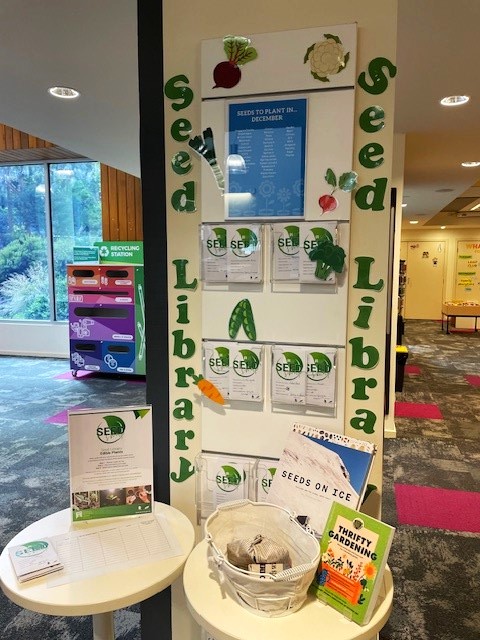Our Sustainable Initiatives
Whitehorse Manningham Libraries are committed to reducing our environmental footprint by adopting sustainable practices that reduce waste, energy and water use where possible. The following programs and initiatives are currently in operation throughout the library service.
 Recycling
Recycling
Books
Discarded library books are reused and recycled in a number of different ways:
- Offered for re-sale via Friends of the Library book sales. Funds raised contribute to library programs and give our community an opportunity to give a book a new home.
-
 A partnership with Julian Wood Bookseller enables the recycling of discarded books which are not appropriate for resale.
A partnership with Julian Wood Bookseller enables the recycling of discarded books which are not appropriate for resale.
Energy efficiency audit tool kits
Whitehorse Manningham Library members can borrow Energy efficient tool kits to take home and audit energy usage.
Energy efficiency toolkit: with non-contact digital thermometer
Kit includes: Energy saving thermometer, Mini non-contact thermometer, Powermate Lite energy meter, Water flow measuring cup, Book 'Your Home', Booklet 'Instruction guide.
Click here to view and/or reserve energy kits.
Energy efficiency toolkit: with thermal imaging camera
Kit includes: Energy saving thermometer, Thermal Imaging camera, Power-Mate Lite energy meter, Water flow measuring cup, Book 'Your Home', 2 Booklets 'Thermal camera user manual, Power-Mate Instruction guide.
Click here to view and/or reserve energy kits.
Mini recycling stations - Manningham Branches
All Manningham Branches have mini recycling stations available during their opening hours.
What can be recycled at these stations?
- Household batteries - must be taped and secured in a bag
- Fluorescent globes - standard light globes and LEDs are not accepted
- Fluorescent tubes
- X-rays
- Small e-waste including items like mobile phones, mp3 players and hairdryers
- Printer cartridges without the packaging
- CDs and DVDs

Further information can be found on the Manningham City Council website.
Recycling Hubs - Whitehorse Branches
This service is no longer available.
Seed Library
Our Seed Library encourages residents of Whitehorse and Manningham, to grow their own vegetables, fruits, and herbs in their own gardens. Library members can take their choice of seeds from each seasonal collection, enjoy their harvest and then ‘return’ seeds from their own yield, to be used in the following year’s crop.
Our Seed Library is available at Vermont South and Warrandyte Library branches.

How does it work?
* Step 1 – "Borrow" seeds for free
* Step 2 – Plant and tend to your crops
* Step 3 – Return some seeds from your yield
Want to learn more?
Update your gardening knowledge by booking into our regular and inspiring gardening events and workshops.
Other sustainable initiatives
Whitehorse Manningham Libraries also supports environmental sustainability by:
- emailing notifications and loans slips
- installation of solar panels and water tanks
- battery recycling program
- recycling of ink cartridges through Planet Ark
- participation in rubbish recycling programs
- the establishment of a Green Office Team
- using re-fill options for dishwashing detergent
- using recycling options for discarded DVDs and CDs
- implementing sustainable procurement practices
- recycling mobile phones and withdrawn IT equipment
- using and producing digital only documents where possible